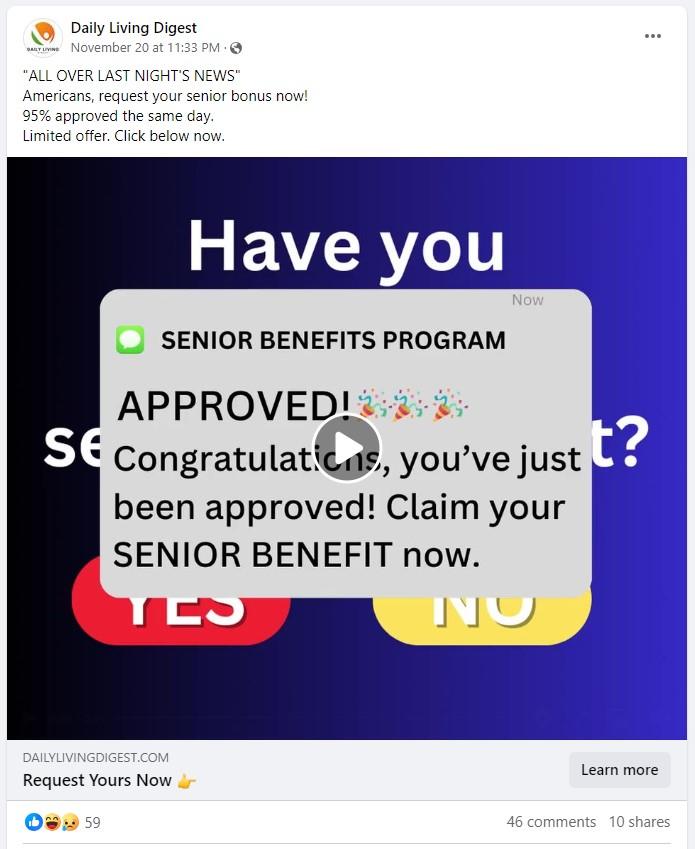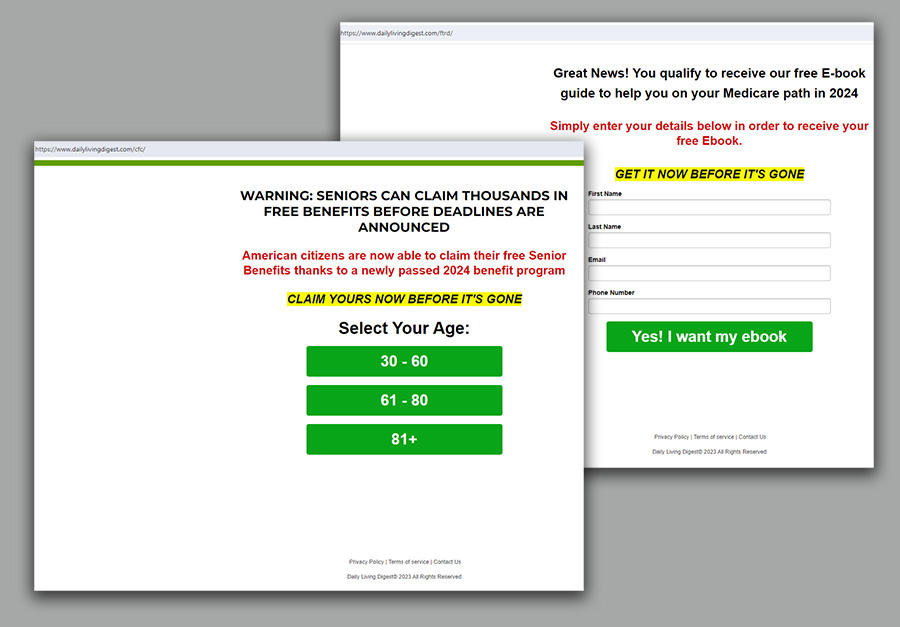
Do 95 percent of people who request senior benefits through an urgent "limited offer" in an ad on social media qualify the same day? No, that's not true: This promotion does not point to an official government website and it is unclear which company runs it. There are multiple red flags that point to it being an information-harvesting ruse for a Medicare scam and not a legitimate service connecting seniors with available benefits.
A post published by the Facebook page Daily Living Digest on November 20, 2023, was captioned:
'ALL OVER LAST NIGHT'S NEWS'Americans, request your senior bonus now!95% approved the same day.Limited offer. Click below now.
This is what the post looked like on Facebook at the time of writing:
(Source: Facebook screenshot taken on Wed Nov 22 15:46:56 2023 UTC)
The text on the video says:
Have you received your senior bonus yet? YES NO
Senior Benefits Program
APPROVED!🎉 🎉 🎉Congratulations, you've just been approved! Claim your SENIOR BENEFIT now.
The post has a link to the website dailylivingdigest.com. Lead Stories found more than one landing page on the Daily Living Digest website (pictured below), which offered seemingly different things, an e-book (page archived here) about Medicare 2024 or a means to claim free "Senior Benefits" (page archived here) but there was no homepage at dailylivingdigest.com, only the message, "The requested URL was not found on this server." These pages use high-pressure tactics with urgent wording, "Get it now before it's gone," when asking seniors for personal information including their phone numbers.
(Source: Lead Stories composite image with dailylivingdigest.com screenshots taken on Wed Nov 22 22:10:56 2023 UTC)
According to DomainTools, the website was registered, on July 24, 2023. The information links at the bottom of the webpages, for the privacy policy, terms of service and contact us, are not hyperlinked. Under those inactive tabs is the copyright "Daily Living Digest© 2023 All Rights Reserved." There is no business entity registered to the name Daily Living Digest in the State of Arizona Corporation Commission database nor listed with the Better Business Bureau. The Facebook page about section lists the address "7301 north 16th street, Phoenix, AZ, United States, 85020." This address is an office space building called The Peak. In a 2023 Streetview image, Daily Living Digest is not a business listed on the signboard in front of the building and a DuckDuck Go Search for the company name and address only point back to the Facebook page.
Lead Stories called the number listed on the Facebook page and a customer service operator answered with a pitch for "value added benefits." When repeatedly asked for the name of the company providing this service, "Senior Benefits" was the only answer before the operator returned to the script requesting personal information and information about current insurance plans. There are several business entities registered in Arizona, both active and inactive, with the words "Senior Benefits" in the name, but none match the Phoenix address listed on the Facebook page.
The official guide to Medicare is a handbook called "Medicare & You" available as a free download from the Medicare.gov website and as the printed handbook mailed to all Medicare households in late September. There is no need to go through a third party or to divulge personal information to get a handbook about Medicare benefits.
There are many known scams targeting seniors with promises regarding benefits, and tricks to steal personal information. Lead Stories reached out by email on November 22, 2023, to the Centers for Medicare & Medicaid Services, the Federal Trade Commission and AARP for comment regarding this specific promotion and will update this article when we receive a reply.
The Federal Trade Commission has a quick list of "Four Signs That It's a Scam." The first three points fit the dynamics presented in this promotion: Warning that scammers pretend to be from an organization you know, they say there's a problem or a prize, and they pressure you to act immediately. The fourth point is that they tell you to pay in a specific way.
An article from AARP's Fraud Watch Network titled "Look Out for Medicare Fraud" describes one scam that involves making a telephone call to a Medicare recipient. They write:
One recurring scam involves a Medicare impersonator calling to say that the agency is moving to plastic cards and they just need to verify your Medicare number to issue the new card. This is how criminals collect thousands of Medicare numbers that are ultimately used to fraudulently bill Medicare or to sell to others who will use the numbers for medical procedures.


















